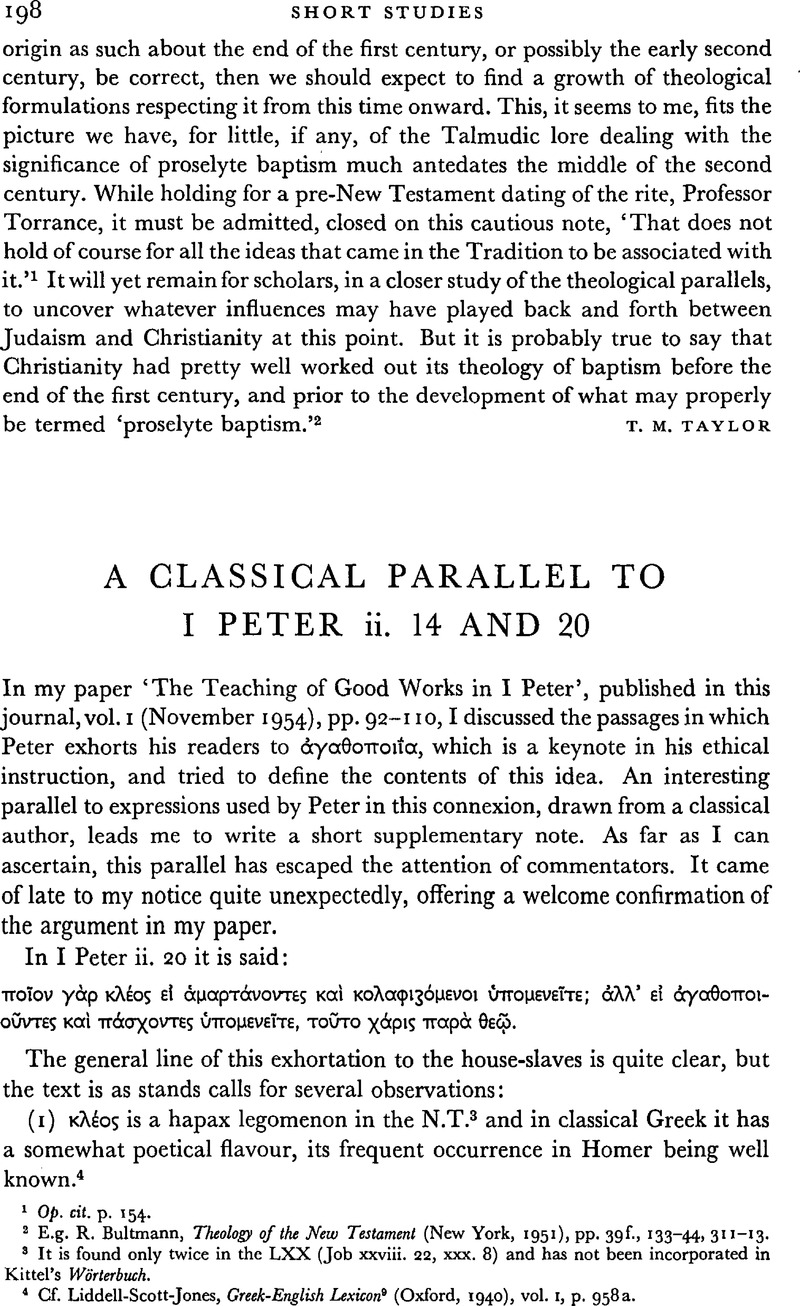Published online by Cambridge University Press: 05 February 2009

page 198 note 1 op. cit. p. 154.
page 198 note 2 E.g. Bultmann, R., Theology of the New Testament (New York, 1951), pp. 39f., 133–44, 311–13.Google Scholar
page 198 note 3 It is found only twice in the LXX (Job xxviii. 22, xxx. 8) and has not been incorporated in Kittel's Wörterbuch.
page 198 note 4 Cf. Liddell-Scott-Jones, , Greek-English Lexicon9 (Oxford, 1940), vol. I, p. 958a.Google Scholar
page 199 note 1 Weidinger, K., Die Haustafeln (Leipzig, 1928), p. 64.Google Scholar
page 199 note 2 Plato, Leges 633A uses both words together. ![]() is more the good report or fame, κλέοζ praise—ἔπαινοζ could not be used in this connexion because the master of the slave cannot be supposed to praise the man he ill-treats.
is more the good report or fame, κλέοζ praise—ἔπαινοζ could not be used in this connexion because the master of the slave cannot be supposed to praise the man he ill-treats.
page 199 note 3 Cf. Gerlach, G., Griechische Ehreninschriften (Halle, 1908), and A. J. Festugiéere, Le monde grécoromain au temps de notre Seigneur (Paris, 1935), vol. II, p. 197.Google Scholar
page 200 note 1 Preisker, H., in: Kittel, G., Theologisches Wörterbuch zum N.T. (Stuttgart), Bd. II, pp. 583–4.Google Scholar
page 200 note 2 Cf. Oxford Classical Dictionary (Oxford, 1949), p. 284, s.v.
page 200 note 3 Cf. the expression in II Cor. iii. 12.
page 200 note 4 Scheller, P., De hellenistica historiae conscribendae arte (diss. Leipzig, 1911), pp. 48–50.Google Scholar
page 200 note 5 Cf. Oxford Classical Dictionary, p. 319, s.v.
page 200 note 6 The difference between ![]() and
and ![]() is unimportant; in fact both words define the same action, but since history does not possess the ius gladii,
is unimportant; in fact both words define the same action, but since history does not possess the ius gladii, ![]() could not be used by Diodorus.
could not be used by Diodorus.
page 201 note 1 English readers will find a convenient translation of Diodorus' Introduction to his Universal History in A. J. Toynbee, Greek Historical Thought, from which I quote a few lines: ‘Ordinary men are transformed by it (history) into leaders; men born to command are stimulated by the immortality of fame which it confers to embark upon noble enterprises; soldiers, again, are encouraged by the posthumous glory which it promises to risk their lives for their country; the wicked are deterred by the eternal obloquy with which it threatens them for their evil impulses; and in general, the good graces of History are so highly praised that some have been stimulated by the hope of them to become founders of states, others to introduce laws contributing to the security of the race, and others to make scientific or practical discoveries by which all mankind has benefited…. History may claim to be the guardian of those who have a reputation to keep, the witness against those who have a reputation to lose…. History is also the mistress of eloquence, the gift of gifts. Eloquence raises the Hellene above the non-Hellene and the educated above the illiterate, and it is the only weapon which enables one man to prevail against many…. Know her (History) by her fruits, and you will find her making for righteousness, denouncing evil, eulogizing the good, and, in a word, endowing those who study her with the sum of human wisdom.’
page 201 note 2 Cf. van Groningen, B. A., De antithese als Griekse denkvorm, in Mededelingen van de Koninklijke Vlaamse Academic voor Wetenschappen Letteren en Schone Kunsten van België, Klasse der Letteren, Jaargang XV (1953), no. 1Google Scholar